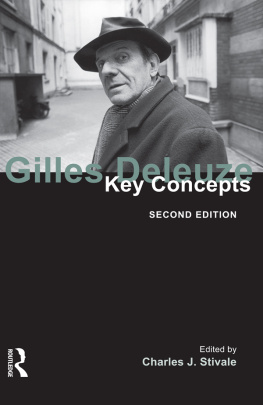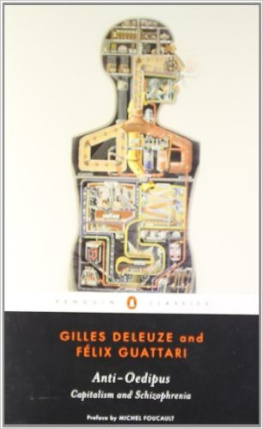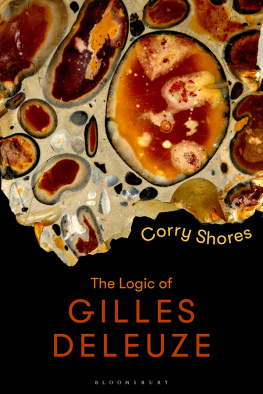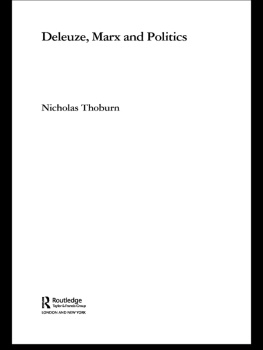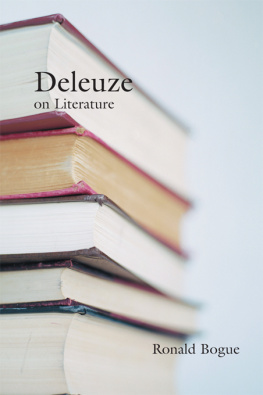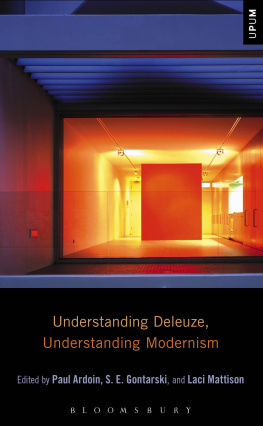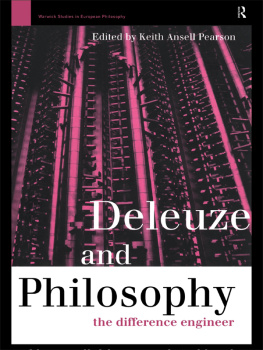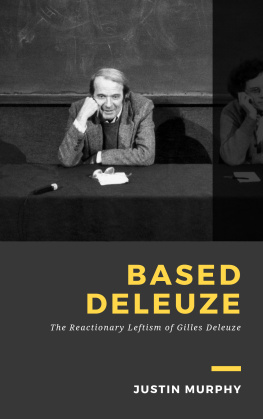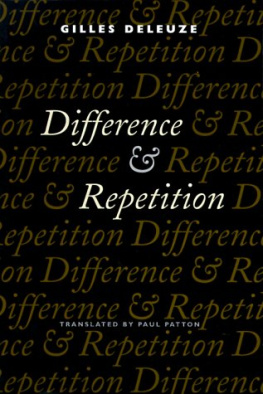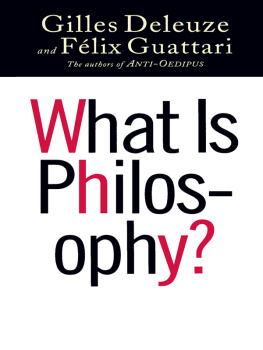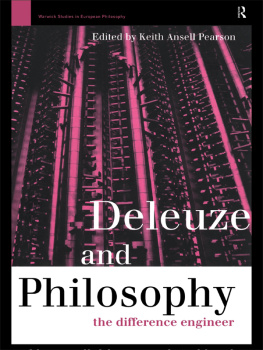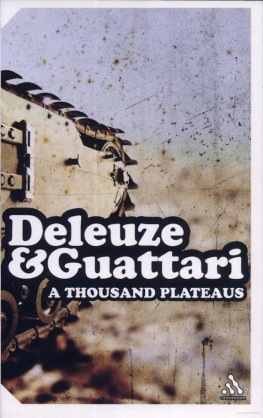Charles J. Stivale (editor) - Gilles Deleuze: Key Concepts
Here you can read online Charles J. Stivale (editor) - Gilles Deleuze: Key Concepts full text of the book (entire story) in english for free. Download pdf and epub, get meaning, cover and reviews about this ebook. year: 2011, publisher: Routledge, genre: Romance novel. Description of the work, (preface) as well as reviews are available. Best literature library LitArk.com created for fans of good reading and offers a wide selection of genres:
Romance novel
Science fiction
Adventure
Detective
Science
History
Home and family
Prose
Art
Politics
Computer
Non-fiction
Religion
Business
Children
Humor
Choose a favorite category and find really read worthwhile books. Enjoy immersion in the world of imagination, feel the emotions of the characters or learn something new for yourself, make an fascinating discovery.
- Book:Gilles Deleuze: Key Concepts
- Author:
- Publisher:Routledge
- Genre:
- Year:2011
- Rating:4 / 5
- Favourites:Add to favourites
- Your mark:
- 80
- 1
- 2
- 3
- 4
- 5
Gilles Deleuze: Key Concepts: summary, description and annotation
We offer to read an annotation, description, summary or preface (depends on what the author of the book "Gilles Deleuze: Key Concepts" wrote himself). If you haven't found the necessary information about the book — write in the comments, we will try to find it.
Gilles Deleuze: Key Concepts — read online for free the complete book (whole text) full work
Below is the text of the book, divided by pages. System saving the place of the last page read, allows you to conveniently read the book "Gilles Deleuze: Key Concepts" online for free, without having to search again every time where you left off. Put a bookmark, and you can go to the page where you finished reading at any time.
Font size:
Interval:
Bookmark:
Charles J. Stivale
In LAbcdaire de Gilles Deleuze (Deleuzes ABC Primer) , the eight-hour video interview with Claire Parnet filmed in 1988-89 and transmitted only in 1995, French philosopher Gilles Deleuze describes his idiosyncratic understanding of the links between friendship, creation and life. Responding to a question from Parnet (in the section F as in Fidelity), Deleuze hypothesizes that in order to form the basis for friendship with someone, each of us is apt to seize on a certain indication of an individuals charm, for example, in a gesture, a touch, an expression of modesty or a thought (even before that thought has become meaningful). In other words, friendship can result from perception of the charm that individuals emit and through which we sense that another suits us, might offer us something, might open and awaken us. And a person actually reveals his or her charm through a kind of dmence or madness, Deleuze says, a certain kind of becoming-unhinged, and as the very source of a persons charm, this point of madness provides the impulse for friendship.
I commence with this angle of approach because, with me, the authors here offer contributions precisely in this spirit, seeking to extend the folds of friendship through which Deleuze lived, wrote, and taught.interdisciplinary connections. In preparing these essays, the authors have been attentive to show not merely what the selected concepts are , but especially what these concepts do, within and beyond philosophy. Rather than necessarily limit each concept to a fundamental essence, the authors consider the proximate other(ness) of the concept(s) engaged, their intersections and linkages with other works, writers, and domains of reflection. Above all, the goal of these essays is to encourage students, new and old, to read Deleuzes original texts by showing readers that while his concepts are located within an intricate and sophisticated web of philosophical linkages, they are also accessible and useful for developing critical reflection beyond the domain of philosophy.
In this introduction, I propose to provide a general, albeit unusual conceptual framework for thinking with and through Deleuzes writing. That is, in contrast to the essays here that link selected works to a specific concept, I offer a more general perspective based on the particular concept of friendship that Deleuze develops throughout his written texts and interviews, as a way, subsequently, to describe briefly the books organization and the place of each essay within it. But first, I consider the trajectory that Deleuze followed in his career from his own perspective on creation and friendship, providing some of Deleuzes own reflections on his intellectual trajectory, alone and with Flix Guattari.
The conception of friendship that Deleuze proposes in LAbcdaire relates more broadly to his reflections elsewhere. Early in his career, Deleuze followed Marcel Proust in affirming, on one hand, that friendship never establishes anything but false communications, based on misunderstandings, and, on the other hand, that there is no intersubjectivity except an artistic one and that only art gives us what we vainly sought from a friend (PS: 42).in LAbcdaire on the fundamental role that encounters (rencontres) play in life. He sees these as equally important in experiencing intensities and multiplicities through art and literature, in generating thought and thereby in moving beyond philosophy through philosophy. And in his earlier Dialogues with Parnet (1977), Deleuze asks a fundamental question in this regard:
Between the cries of physical pain and the songs of metaphysical suffering, how is one to trace out ones narrow, Stoical way, which consists in being worthy of what happens, extracting something gay and loving in what occurs, a glimmer of light, an encounter, an event, a speed, a becoming?
(D: 66, trans, mod.)
Deleuzes idiosyncratic definition of his intellectual project in the early years reveals both his modesty and his rapier wit, presented in his 1973 letter to Michel Cressole:
I belong to a generation, one of the last generations, that was more or less bludgeoned to death with the history of philosophy. The history of philosophy plays a patently repressive role in philosophy Many members of my generation never broke free of this; others did, by inventing their own particular methods and new rules, a new approach. I myself did history of philosophy for a long time, read books on this or that author. But I compensated in various ways.
(N: 5-6)
His approach was to look at authors whom he judged to challenge the rationalist tradition, notably Hume, Lucretius, Nietzsche and Spinoza, as well as Kant, who Deleuze treated as an enemy, yet whose work required an effort of discernment and understanding. According to his recollections of this project, Deleuze had to adopt particularly rigorous survival strategies:
I suppose the main way I coped with it at the time was to see the history of philosophy as a sort of buggery [enculage] or (it comes to the same thing) immaculate conception. I saw myself as taking an author from behind, and giving him a child that would be his own offspring, yet monstrous. It was really important for it to be his own child, because the author had to actually say all I had him saying. But the child was bound to be monstrous too because it resulted from all sorts of shifting, slipping, dislocations, and hidden emissions that I really enjoyed.
(N: 6)
Among the authors that correspond to this image of doing histor of philosophy, Deleuze cited Nietzsche in his 1962 work and Bergson i his 1966 work. Nietzsche in particular, Deleuze maintained, extricate me from all this, since Nietzsche gets up to all sorts of things behin your back, giving Deleuze a perverse taste for saying simple thing in [his] own way, in affects, intensities, experiences, experiments (N: 6). Through Nietzsche, Deleuze opened himself to the multiplicitie everywhere within [individuals], the intensities running through them that is, a depersonalization opposite [that] effected by the history of philosophy; its a depersonalization through love, rather than subjection (N: 6-7) . This opening toward depersonalization and love led Deleuze towards two projects at the end of the 1960s, Difference and Repetition and The Logic of Sense , to which one can add his first boo on Spinoza. While still heavily laden with many academic elements these books were, for Deleuze, an attempt to jolt, to set in motio something inside me, to treat writing as a flow, not a code (N: 7). Such a mode of reading, Deleuze argued, is:
[an] intensive way of reading, in contact with whats outside the book, as a flow meeting other flows, one machine among others, as a series of experiments for each reader in the midst of events that have nothing to do with books, as tearing the book into pieces, getting it to interact with other things, absolutely anything, [this] is reading with love [une maniere amoureuse] .
(N: 8-9)
Of course, this is not an easy process, for it is one that situates the person along, or in relation to, the line Outside:
something more distant than any external world. But its also something closer than any inner world managing] to fold the line and establish an endurable zone in which to install ourselves, confront things, take hold, breathe in short, think. Bending the line so we manage to live upon it, with it: a matter of life and death.
(N: 111)
Deleuze summed up a crucial encounter at this point in his career, at the end of the 1960s, with the phrase And then there was my meeting with Flix Guattari (N: 7), later describing him as a man of the group, of bands or tribes, and yet he is a man alone, a desert populated by all these groups and all his friends, all his becomings (D: 16). Deleuze discussed the importance for his work of this collaboration and friendship in a number of texts, and all suggest the significant connections that Guattari was able to provoke in Deleuzes creative process and, of course, vice versa. For example, in an interview with Robert Maggiori following the 1991 publication of What Is Philosophy? and shortly before Guattaris death, Deleuze noted:
Font size:
Interval:
Bookmark:
Similar books «Gilles Deleuze: Key Concepts»
Look at similar books to Gilles Deleuze: Key Concepts. We have selected literature similar in name and meaning in the hope of providing readers with more options to find new, interesting, not yet read works.
Discussion, reviews of the book Gilles Deleuze: Key Concepts and just readers' own opinions. Leave your comments, write what you think about the work, its meaning or the main characters. Specify what exactly you liked and what you didn't like, and why you think so.

